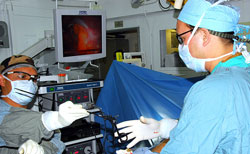
Top stories


ESG & Sustainability#BudgetSpeech2026: SRD grant unchanged, other Sassa social grants see hike
7 hours




More news











ESG & Sustainability
South Africa’s carbon tax should stay: climate scientists explain why











Besides regular check-ups as part of preventative healthcare, it is also recommended that men try to achieve a healthy lifestyle by exercising frequently, maintaining a healthy weight, which all plays a role in reducing chances of contracting lifestyle diseases and cancers that prevail in the male gender.
The cancers prevalent today are testicular cancer, which is commonly contracted by men between ages of 15 and 25, but can occur at any age, and prostate cancer. Men who have an increased chance of developing prostate cancer are over 40, and consume more than two standard alcoholic drinks per day; do not get enough exercise; have a history of prostate cancer in the family and follow a poor diet.
Since 2005, according to the report done by the Cancer Association of South Africa, 4,439 men have been treated for these types of cancers. In the light of these alarming statistics, Bestmed, the fifth largest medical aid scheme in South Africa has launched an oncology programme that now has 803 members, which encourages them to take preventative healthcare seriously, and use resources that are available to them for more information about these diseases.
According to Bestmed's Dr Elsabe Hammann, a healthcare practitioner, testicular cancer can be prevented, like many other lifestyle diseases. The key to living longer is adopting the key pillars of wellness - being active, eating well, and looking after yourself.
"Currently, prostate cancer is the second most frequently diagnosed cancer, and the sixth leading cause of death in males worldwide," comments Dr Hammann. "About one in seven males are diagnosed with prostate cancer at some point during their lifetime. It can spread to nearby organs, travel through bloodstream or to the bones, which can be treated and controlled, however can no longer be cured, at this stage. Symptoms include; difficulty urinating, blood in the urine or semen, general pain in the lower back, pelvic discomfort, bone pain, and erectile dysfunction."
On the other hand, testicular cancer causes are still unknown, but research done by the American Cancer Society has shown that genetic changes could play an important role in the development of testicular cancer. Research has also revealed that the risk for the disease is higher in first-degree relatives of cancer patients than in the general population where about 2% of testicular cancer patients reported having an affected relative.
According to Dr Hammann, the most common symptom for testicular cancer is swelling or a knot in one testicle and in most cases, it is not painful and is sometimes ignored by the patient because of its sensitive nature. Heavy sensation in the lower abdomen could be the presenting symptom.
In the past, metastatic testicular cancers were fatal, but recent advances in the treatment of these types of cancer with high-dose chemotherapy have considerably improved the prognosis, reducing the risk of fatality and increasing the cure rates to 90-95% and making testicular cancer highly curable. Patients who experience a hematoma with trauma should undergo evaluation to rule out cancer. The prognosis depends upon the histologic type of cancer, stage, and other features such as tumour marker and type of metastatic disease.
"Through Bestmed's oncology programme, members with testicular and prostate cancer are given an opportunity to register. The programme provides cancer benefits, applying evidence-based medicine principles and considering affordability to the different benefit options. It uses the Standard option of the Independent Clinical Oncology Network (ICON) for all members, which Bestmed currently averages age groups of 38 years, with its youngest member being 4 years old. The prevalence of prostate cancer in the Bestmed population tallies about 4.14 cases per 1,000 lives," says Dr Hammann.